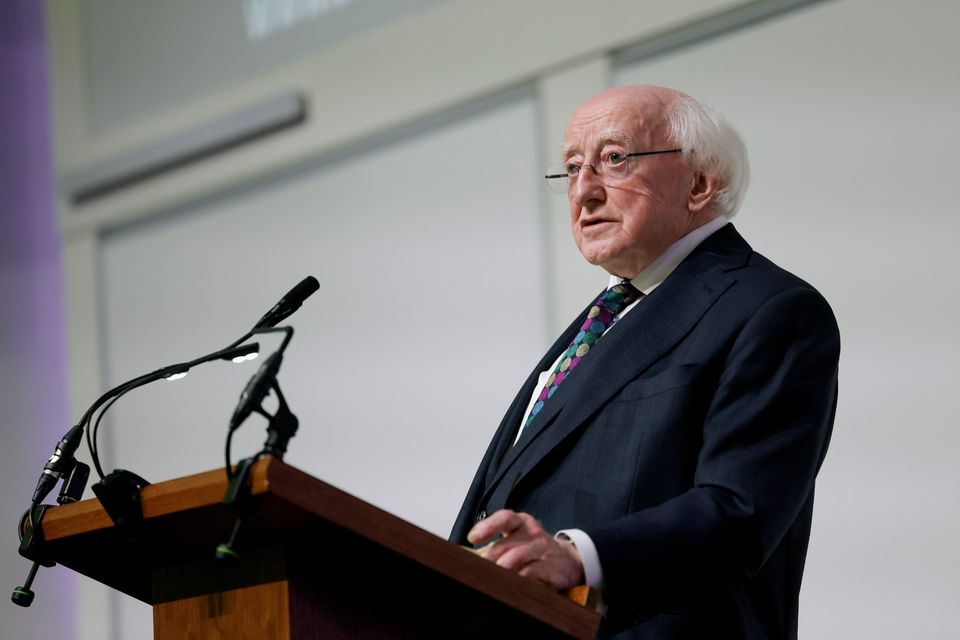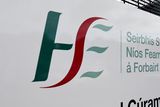‘It breaks my heart’ – President Michael D Higgins said breaches of international law ‘very clear’ in Gaza
President Michael D Higgins delivering a lecture in Manchester this evening. Photo: Maxwell Photography.
President Michael D Higgins has said he is in “no doubt whatsoever” that there are “clear” breaches of international law occurring in Palestine.
Speaking to reporters in Manchester today, Mr Higgins welcomed comments made by Tánaiste Micheál Martin in Rafah yesterday, who said the people of Gaza are being “collectively punished, contrary to international law”.
Mr Higgins said it was important that Mr Martin was able to see the evidence of loaded trucks on the border with Gaza and that he was “pleased” with his remarks.
“I strongly agree with him. It’s a statement I made a long time ago myself that what was unfolding was collective punishment. I also very, very much have no doubt whatsoever that (there are) clear breaches of international law, both in relation to the humanitarian side and other kinds.”
He told the Irish Independent that those who have blocked aid entering Palestine are “responsible for the deaths of civilians” and that malnutrition has become part of a “tactic of confrontation, of war”.
“That’s outrageous. It’s scandalous, what is happening, and it breaks my heart.”
He described the prevention of medical aid and food from entering Gaza as an “appalling action”.
Mr Higgins was speaking during his visit to Manchester, his first visit abroad since he was discharged from hospital last month having suffered a mild stroke.
Speaking today, Mr Higgins said his left side, including his left hand and hip, had been impacted by the issue but that his work for the rest of his term will not be impacted and he is in “very good shape”.
He said he first felt tingling symptoms in his arm while he was working on a speech, later attending St James’ Hospital in Dublin where he stayed for several days early last month.
It has “exacerbated” some difficulties in his lower back which will be “dealt with next week,” he said.
It led to him to “cut back” on his appearances at sports events, but Mr Higgins said he intends to be “back pitchside again within a matter of weeks” and it has not affected his work for the rest of his term as president.
He was conferred with an honorary doctorate from his alma mater the University of Manchester yesterday, telling those gathered he accepted it not just for himself but “for all migrants”.
Mr Higgins told reporters today that he believed some of the strategy and migration policies of the European Union are “mistaken” and are not “evidence based”, in his view.
He said migration is caused by issues of food security, climate change or other threats, adding that it is “predictable” and the contributing issues must be addressed.
“When you see endless statements about ‘we’re responding to a migrant flow’ or whatever, I push that back and I say, ‘how are you interpreting migrant flows?’”.
Mr Higgins said some population movements in Africa are “getting caught up with some of the strategies that the European Union is proposing”.
He also addressed the “difficult situation” online, where there is widespread use of media “which has no constraint on it, you can say anything you like with impunity”.
"It reveals a great lack in relation to the responsibilities of those large organisations who are responsible to social media for fulfilling their obligations.”
He said small incidences can be magnified on social media, adding: “The tendency might be to, say, an individual organisation can say, ‘This is happening, we’re going to bring you there as it gets more horrific’. Without responsibility, with no presentation of context, no discussion on its sources or whatever, that is a real issue.”
Asked whether social media companies need to be held to account, Mr Higgins said: “There’s a huge lacuna there absolutely."
Mr Higgins is due to deliver the first inaugural John Kennedy Lecture at the University of Manchester this evening, during which he will discuss the issue of academic freedom among other issues.
Asked whether he was referring to ‘cancel culture’ or fears people may have to express certain views, Mr Higgins said: “Well, I am and the point about it is I know people who have been denied tenure in the United States and people who have been removed from positions.”
Mr Higgins said the management model of a university should not impact the capacity of faculty to be creative.
“You get people coming in and thinking that this is in the name of efficiency, but if it is efficient, it is not effective, because that has the consequence of alienating members who should be in a scholarly community,” he said.
“And in that scholarly community – and I’ve been in many – there is even a place for eccentricity, for giving it colour.”
Mr Higgins also delivered the inaugural John Kennedy lecture at the University of Manchester this evening, telling those gathered that the use of negative language around migrants is a “damning indictment of our present circumstances” as he recalled his own experience as a student in the UK.
He told those gathered about his family “scattering” in the 1960s, when his sisters emigrated to Manchester and he later followed them as a postgraduate student.
During the lecture, he questioned why the threat of war continues to appear “so menacing and widespread”.
“Why do we accept failure in diplomacy and regard war as a natural inevitability?”
He said immobilism in the face of such conflicts should be challenged and “rather than competing in siren calls for increasing defence budgets across the world”, there must be a greater awareness of existential challenges faced, from global hunger to poverty and climate change.
“All of the experience of my own as a migrant studying migration at the end of the 1960s was long after the great tidal waves of Irish arrivals at midpoint and the end of the 19th century,” he said.
“Migrants have always been at particular risk from gross stereotyping, regarded as marginal people, insufficiently grateful, reluctant to acknowledge the virtues of the point of destination, forgetting their origins and practices, unwilling to assimilate.”
He quoted the UN High Commissioner for Refugees, Filippo Grandi, who recently said he had “never seen such toxicity, such poison” in the language of politics, media, online and in everyday conversations about refugees, migrants and foreigners.
“That we have sunk to this level, that those with an authority and experience are driven to use language like that, represents little less than a damning indictment of our present circumstances,” Mr Higgins said.
He added: “We are all migrants in time. Migration has been the natural condition of humankind as long as historical facts have been recorded.”
Join the Irish Independent WhatsApp channel
Stay up to date with all the latest news















